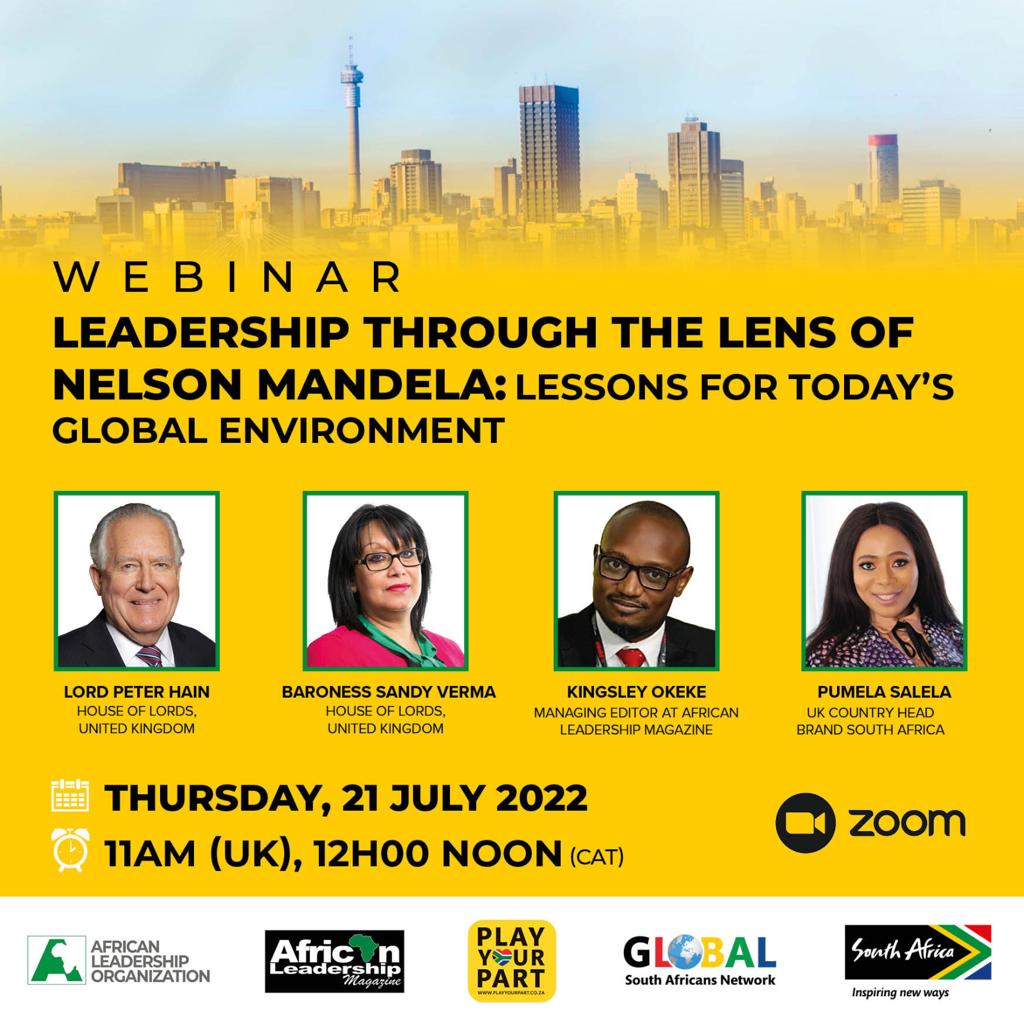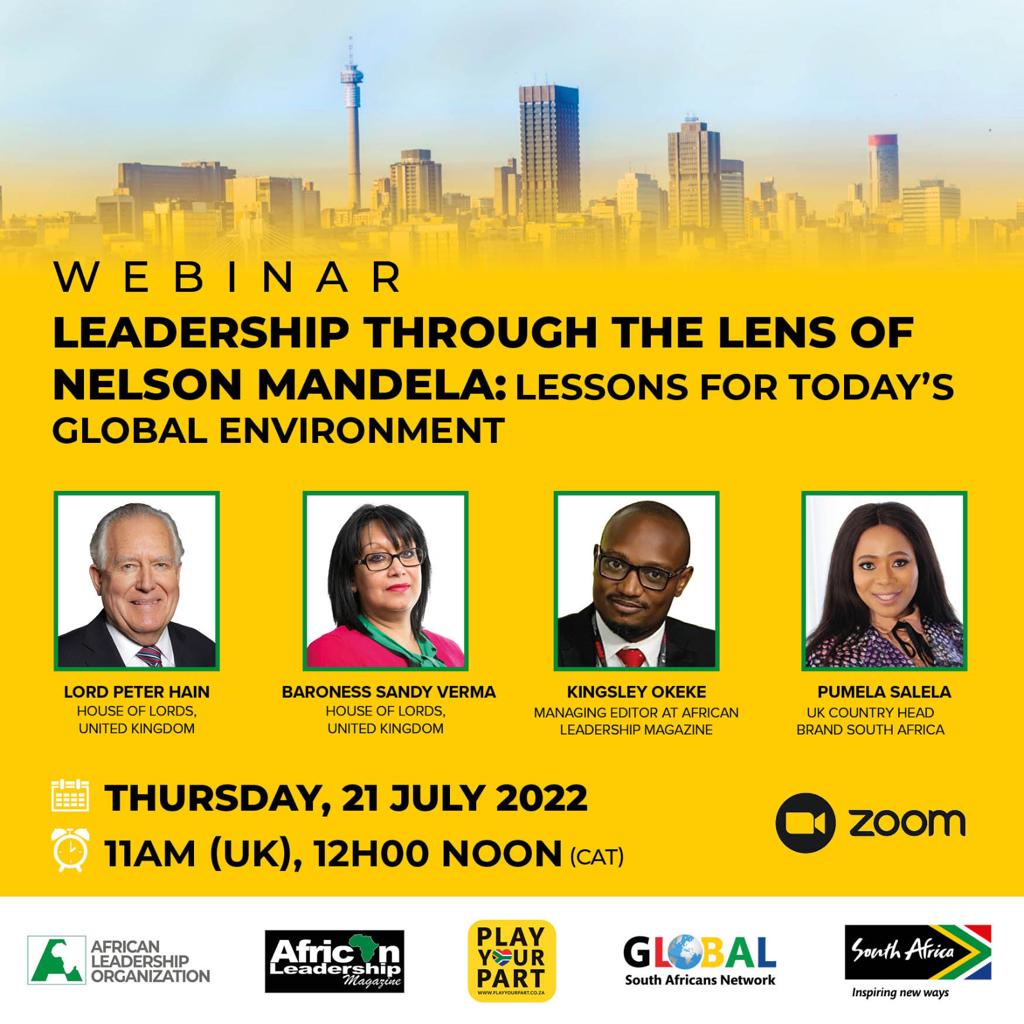Portsmouth
United Kingdom
July 21, 2022
A member of the UK House of Lords, Lord Peter Hain, has highlighted some of the undeniable qualities of late President Nelson Mandela, former President of South Africa, that global leaders must adopt to help curb some of the prevailing global challenges.
Lord Hain made this call during this Keynote address at the just concluded Webinar organized by Brand South Africa, in partnership with the African Leadership Magazine UK.
The Webinar, titled Leadership through the Lens of Nelson Mandela: Lessons for Today’s Global Environment, was organized as part of activities to mark the 2022 Nelson Mandela Day, held annually in July to commemorate the UN declaration, celebrating the leadership legacies of the great Nelson Mandela.
According to Lord Hain, “Nelson Mandela’s greatness as a leader has some lessons we can all learn from as leaders. Mandela not only endured his incarceration in the tiny cell in Prison at Robin Island but also became stronger. Also unique was his courage to face the judge at the Rivonia Trial in 1964.”
Lord Hain added, “he didn’t try to apologize for leading the underground campaign after the ANC was banned. He stood by his principles and gave a memorable speech which many of us still remember.”
“In the circumstance, many of us would have thought to make a speech to appeal to the judge. Because they all faced the death sentence; but, he gave this defiant speech in which he said what his ideals were, that he continued to believe in them and that if he had to die for them, then he’d accept that as well. Of course, we know that he was sentenced to life imprisonment instead,” he said.
Lord Hain also highlighted Nelson Mandela’s toughness as a virtue that leaders must emulate in today’s world. In his words, “The second characteristic of his Leadership was his toughness. People always remarked on his humanity, generosity, and refusal to be vengeful regarding his former oppressors, but he was also very tough. When the President at the time was negotiating with Nelson Mandela, it was a very tough negotiation because Nelson Mandela stood on his principles and refused to give in to all forms of tactics and intimidation.”
“Those who now criticize Nelson Mandela failed to recognize the historic situation in which he found himself and the ANC leadership found themselves as well. And he was very, very tough.
He said, no, we will stick by our principles of one person, one voice of a democracy representing the will of the people. And, of course, he won through on that, despite the President unleashing the security forces who meted out a wave of terror on grassroots ANC supporters. More people were killed in that period between Nelson Mandela coming out of Prison and becoming President than at any time in apartheid history because the regime was seeking to negotiate its opposition.”
“The apartheid government realized it had to, or the country would collapse into civil war, economic decay, and deprivation. So, it was negotiating with Nelson Mandela and trying to assert its power and kill many of its followers. So, he showed great toughness and resolution in standing up for what he believed in, and ultimately winning through the next principle is his determination,” he added.
A former UK government minister, Lord Hain, hailed Nelson Mandela’s commitment to promoting constitutional democracy.
According to him, “Mandela’s belief in a constitutional democracy is another sign of His greatness as a leader, as is his generosity. He was always insisting on never hating anybody. That’s difficult for all of us emotionally, from time to time in our lives, especially if we read politics. And never humiliate your enemy. Because he had this phrase about, there is nobody so dangerous as one who was humiliated. So, he believes in respect, even for your enemies, but remaining resolute and tough in sticking to your principles.
Nevertheless, I ended up on this other character as a leader.”
He also described Nelson Mandela as a people person. Hear him, “I don’t boast about the fact that I have had the privilege not just as a friend of Nelson Mandela, but also to meet leaders right across the world in my position as a government minister, a cabinet minister, and in other roles that I’ve played in over half a century in politics. I’ve had kings and queens, including the British monarch. I’ve met presidents and prime ministers. I’ve met pop celebrities, rock stars, and sporting stars. I’ve never met anybody like Nelson Mandela, who is a people person. He was a people’s leader. He never lost his interest in people.” And that is one of the things that I think marked his greatness.
The webinar was organized by Brand South Africa in strategic partnership with the African Leadership Magazine UK. It had speakers drawn from the political and diplomatic communities, including Lord Peter Hain, a Member House of Lords, Baroness Sandy Verma, a member House of Lords, Pumela Salela, UK country Head, Brand South Africa, Kingsley Okeke, Group Managing Editor, African Leadership Magazine U.K. In their responses to the discussions, Dr Liaqat Alli Azam, CEO of Leading Like Mandela Leadership Institute, and Dr Thelela Ngcetane-Vika, of Traversing a Leadership Avalanche, took turns to underscore each speaker’s contributions and how it relates to the prevailing challenges confronting the world.
The webinar, which is designed to celebrate one of Africa’s most extraordinary leadership exports-Nelson Mandela, is organized in partnership with the African Leadership Magazine U.K.
The world is at a critical juncture and in dire need of leadership. With the rising cases of Coup De tat in West Africa and the global uncertainties occasioned by the war between Ukraine and Russia – leading to a deeply polarized world, this conversation is as important today as it was many years ago.
Nelson Mandela is an asset to South Africa, Africa and the world. This event helps to therefore remind leaders across all facets, including governments, civil society and business, that leadership is all that matters in critical times.
The webinar also explored how leaders can draw inspiration from Nelson Mandela’s leadership style and apply it to business, civil society and government. They will reflect on how they view leadership through the lens of Nelson Mandela.
About Brand South Africa
Brand South Africa is the official marketing agency of South Africa, with a mandate to build the country’s brand reputation to improve its global competitiveness. Brand South Africa’s primary focus is to develop and implement proactive, coordinated marketing and communications reputation management strategies for South Africa. Our main objective is to market South Africa to domestic and international audiences, positioning South Africa as a competitive investment destination and inspiring and instilling active citizenship amongst South Africans.
About African Leadership Magazine:
The African Leadership magazine is published by African Leadership (U.K.) Limited a company registered in the United Kingdom. The magazine focuses on bringing Africa’s best to a global audience, telling the African story from an African perspective; while evolving solutions to peculiar challenges the continent faces today.
Since its maiden edition, African Leadership Magazine has become a leading pan-African flagship leadership-focused publication read by over 1 200 000 targeted international investors, business executives, government policymakers, and multilateral agencies in Africa, the Middle East and Asia, Europe, and the U.S. It is distributed at major international and African Leadership events around the world.
The magazine has over 1 000,000 subscribers/Followers on Facebook and a virile readership on other social media platforms. It is a niche and unbiased African voice born out of a desire to tell the African story from an African perspective by focusing on individuals and corporates known for their legacy-based approach to leadership.
END


